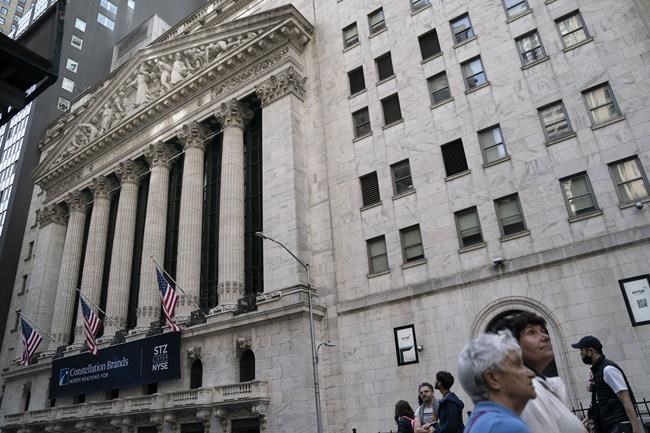NEW YORK (AP) — A swift jump in Treasury yields rattled Wall Street Wednesday, weighing down stock indexes at the start of another month in what’s been a turbulent year. The S&P 500 fell 0.7% after an early morning gain quickly vanished. Stocks began their slide immediately after the release of several reports on the U.S. economy, including one showing manufacturing growth was stronger last month than expected. That bolstered investors’ expectations for the Federal Reserve to continue raising interest rates aggressively to slow the economy in hopes of reining in inflation. Treasury yields rose sharply, sending the yield on the 10-year note up to 2.92%.
THIS IS A BREAKING NEWS UPDATE. AP’s earlier story follows below.
NEW YORK (AP) — A swift jump in Treasury yields is rattling Wall Street on Wednesday, weighing on stock indexes at the start of another month in what's been a turbulent year.
The S&P 500 was 0.3% lower in afternoon trading after veering between a gain of 0.8% and a loss of 1.4% in choppy trading. Stocks began their slide immediately after the release of several reports on the U.S. economy, including one showing manufacturing growth was stronger last month than expected. That bolstered investors' expectations for the Federal Reserve to continue raising interest rates aggressively to slow the economy in hopes of reining in inflation.
The Dow Jones Industrial Average was down 112 points, or 0.3%, at 32,881, as of 2:55 p.m. Eastern time, after losing an early gain of 282 points. The Nasdaq composite was 0.2% lower after giving up an early 1.3% gain.
Such swings have become routine on Wall Street amid worries that too-aggressive rate hikes by the Fed may force the economy into a recession. Even if it can avoid choking off the economy, higher rates put downward pressure on stocks and other investments regardless. High inflation is meanwhile eating into corporate profits, while and business-slowing, have also weighed on markets.
The Fed has signaled it may continue raising its key short-term interest rate by double the usual amount at upcoming meetings. Speculation built last week that the Fed may consider a pause at its September meeting, which helped stocks to rise. But such hopes diminished after Wednesday's manufacturing report from the Institute for Supply Management.
It showed U.S. manufacturing growth accelerated last month, contrary to economists’ expectations for a slowdown. A separate report said that the across the economy ticked a bit lower in April but remains much higher, at 11.4 million, than the number of unemployed people.
Following the reports, traders are now betting on a 60% probability that the Fed will raise its benchmark short-term rate to a range of 2.25% to 2.50% at its September meeting. A week ago, the majority of bets was on a lower level, at a range of 2% to 2.25%, according to CME Group.
The yield on the two-year Treasury, which tends to follow expectations for Fed moves, jumped with those expectations. It rose to 2.65%, up from 2.56% just before the manufacturing report’s release.
Wednesday also marks the start of the Fed’s program to pare back some of the trillions of dollars of Treasurys and other bonds that it amassed through the pandemic. Such a move should put upward pressure on longer-term rates.
The 10-year Treasury yield rose to 2.93% from 2.84% just before the report’s release.
Airlines and stocks of other travel-related companies were some of Wednesday's biggest losers on Wall Street amid worries that inflation is slicing away their earnings.
, for example, said it expects to see fuel costs of $3.60 to $3.70 per gallon this quarter, up from its prior forecast of up to $3.35. Even outside of fuel, Delta said expenses could soar up to 22% above 2019 levels on a per-seat basis. That’s up from an earlier forecast of 17%,
Delta’s stock fell 4.8% even though it also said revenue trends are strengthening. With passengers paying higher fares, Delta said it may get a key revenue measure fully back to 2019 levels.
Norwegian Cruise Line fell 4.2%, and United Airlines lost 4.3%.
On the winning side were energy stocks, which rose with the price of crude oil. ConocoPhillips gained 3.4%, and Exxon Mobil rose 1.9% as a barrel of benchmark U.S. crude rose 0.5% to settle at $115.26. Brent crude, the international standard, added 0.6% to $116.29.
The biggest gain in the S&P 500 came from Salesforce.com, which reported stronger profit for the latest quarter than analysts expected and raised its forecast for the year. Its stock rose 10.9%.
___
Veiga reported from Los Angeles.
Stan Choe And Alex Veiga, The Associated Press


